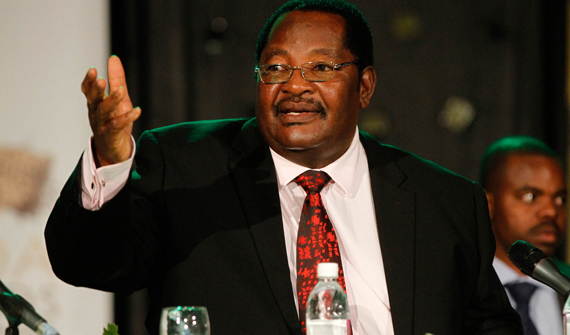
ZIMBABWEANS in the Diaspora have pledged to invest back home and help resuscitate the economy, which is starved of foreign direct investment, on condition the Zanu PF-led government allows them to exercise their voting rights.
BY Khanyile Mlotshwa
The government is currently on a mission to lure Diasporans to invest in the country to give the economy a new impetus.
The Diasporans also said they needed assurance from the government that their investments would be protected and that authorities would help them negotiate the extension of their special permits that end in December 2017.
 Obert Mpofu
Obert Mpofu
“Most people want to link their investment to the right to participate in an election process. We know the government’s attitude towards the Diaspora vote,” chairperson of the Zimbabwe Community in South Africa, Ngqabutho Mabhena, told Southern Eye last week.
The Diaspora in South Africa represents the biggest community of Zimbabweans in any one country with over one million said to be living in Africa’s second biggest economy.
“We know that a lot of people are buying residential stands and building homes are the Diasporans. This, in our view, provides security as the money will not go direct to government, but to private property owners or to local authorities. Outside that, there is no confidence on the part of the diasporans to invest through government or its agencies,” he said.
- Chamisa under fire over US$120K donation
- Mavhunga puts DeMbare into Chibuku quarterfinals
- Pension funds bet on Cabora Bassa oilfields
- Councils defy govt fire tender directive
Keep Reading
The Zimbabwean government has since 2000 denied Zimbabweans based outside the country the right to vote.
Analysts have said the fear is that the Diaspora is opposed to the ruling party.
Macro Planning and Investment Promotion minister Obert Mpofu recently said the government was planning to engage over three million Diasporans, starting next month, through conferences in the United Kingdom, South Africa and Australia.
This comes amid reports that Diasporans were contributing about $1,5 billion to the fiscus in annual remittances.
In social media networks, people who aired their views were clear on the “politics” of their demand for the voting right.
“The French Revolution was based on the principle of no taxation without representation,” wrote one contributor to the debate. “Similarly, no Diasporan vote, no investment. It makes sense that as they lobby for the Diasporan investment, we also lobby for Diasporan enfranchisement on a quid pro quid (something for something) basis.”
Mabhena said Zimbabweans who are holders of the South African special permits, that expire on December 31, 2017, were very open to the government initiative with the hope that the government will negotiate an extension of the permits on their behalf.
“They believe that it will assist in the extension of their permits beyond 2017 as they would be playing a critical role in the development of our economy through this investment initiative by the government,” he said. “We would want to meet government representatives and get more clarity and see if we can link the need to extend the special permits through this process.
“We are busy working on a document which will highlight the role Zimbabweans based in South Africa play in economic development back home. You will know that omalayitsha are playing a critical role in the movement of goods to Zimbabwe sent by those in South Africa. Money transfers to Zimbabwe from South Africa is now a big business. Our document will speak to some of these issues. Our mandate is to ensure that special permits are renewed in 2017, hence our willingness to engage the government. Our government should then assist us to engage the South African government.”
In 2009, the Zimbabwean Diaspora in the UK snubbed the then Prime Minister Morgan Tsvangirai when he invited them to come back home, saying the situation had improved.










